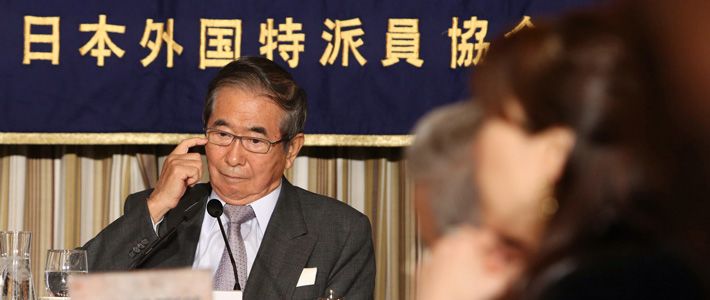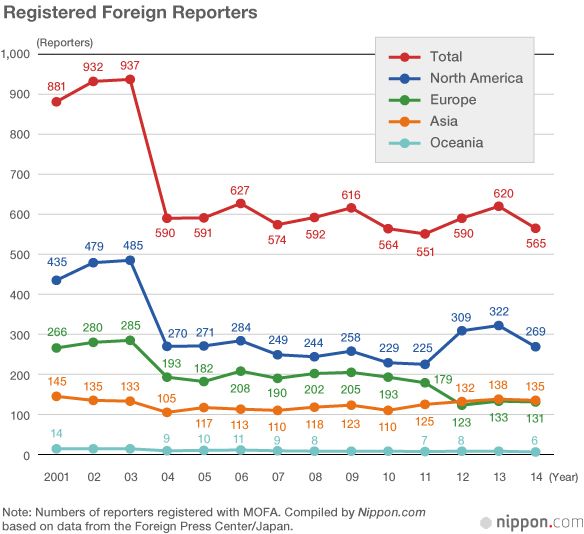
Has the World’s Media Lost Its Appetite for Japan?
Society- English
- 日本語
- 简体字
- 繁體字
- Français
- Español
- العربية
- Русский
According to David Pilling, former Tokyo bureau chief for the Financial Times, there are two main factors behind a steady decline in the foreign media’s coverage of Japan in general. In an email exchange, he told Nippon.com that first, “attention on Japan has waned and is now focused on other countries, particularly China. In the 1970s and 1980s, Japan was seen as a ‘miracle’ economy and the world wanted to figure out what was going on. In the 1990s, they wondered what had gone wrong and whether Japan might crash and cause a global financial crisis.”
Pilling, now based in Hong Kong as Asia editor of the Financial Times, says that when it comes to present-day Japan, a nation seemingly heading toward stagnation is “not such a great story.” He adds, though, that “Japan is now a bit more interesting, with Abenomics and tension with China. But once correspondents have left it’s hard to bring them back.”
Another factor Pilling notes is a more general decline in the media industry. As he explains, a Financial Times staff in Tokyo that once boasted six full-time reporters has now dwindled to just three. “Like many media organizations, we have cut back in Japan and beefed up in China and India.”
However, Pilling adds that “the business press likes the story about radical monetary policy” and is still obsessed with Sony’s “travails,” while robots also remain a “perennial favorite.”
“Then there are the social stories that continue to fascinate,” he goes on. “There is still a market for stories about Japanese subculture, manga, art, and so forth. . . . The ageing story is also interesting for readers, many of whom live in countries that are also on the verge of Japan-style demographic change.”
Interest on the Rise in Asia
The November 2011 issue of the Number 1 Shimbun, produced for members of the Foreign Correspondents’ Club of Japan, carried an interview with Ma Jie, a reporter from China’s state-run Xinhua news agency. He said that while many Western news bureaus are scaling back in Japan, Xinhua is growing fast, and had 17 correspondents in Tokyo at the end of 2011, up from 12 three years before.
Ma also expressed a belief that China has much to learn from Japan, speaking of the need to “discover how Japan manages its society, its education and economy. Whenever a problem occurs in China, we’re asked to research how this country coped.”
In the same issue of Number 1 Shimbun, Lee Jongrak of the Seoul Shimbun said that the Korean media maintains keen interest in many aspects of Japan. “I write a lot about the history between the two nations, comfort women, the territorial problem and Dokdo (Takeshima),” Lee offered.
A look at the data on foreign journalists registered with the Ministry of Foreign Affairs shows that while the ranks of reporters from North America and Europe may indeed be on a steady decline, the numbers from Asian countries have been increasing. The MOFA figures also show that the total number of foreign reporters in Japan plummeted from 937 in 2003 to 590 in the following year. But according to officials, this was due to tightened regulations on registration rather than decreased foreign interest in Japan. Since 2004, the number has remained fairly steady at around the 600 level.
The number of regular members of the FCCJ, another yardstick for the activities of the foreign media, has also been falling slowly but steadily for several years, declining from 329 in 2010 to 302 last November. Japanese reporters seeking to join the club face stringent membership criteria, including a minimum requirement for time spent as an overseas correspondent. But according to one club official, some foreign media organizations have been trying to cut costs by reducing their numbers of reporters with FCCJ membership.

Regular FCCJ Members
| Foreign Members | Japanese Members | Total | |
|---|---|---|---|
| April 2001 | 150 | 193 | 343 |
| April 2002 | 157 | 204 | 361 |
| April 2003 | 147 | 195 | 342 |
| April 2004 | 143 | 189 | 332 |
| April 2005 | 141 | 189 | 330 |
| April 2006 | 154 | 193 | 347 |
| April 2007 | 150 | 202 | 352 |
| April 2008 | 159 | 194 | 353 |
| April 2009 | 144 | 182 | 326 |
| April 2010 | 148 | 181 | 329 |
| April 2011 | 132 | 184 | 316 |
| April 2012 | 127 | 185 | 312 |
| April 2013 | 127 | 182 | 309 |
| April 2014 | 129 | 180 | 309 |
| November 2014 | 125 | 177 | 302 |
Note: Compiled by Nippon.com based on data from the FCCJ.
English Newspapers Struggling
At one time, English-language print newspapers produced by Japan’s three biggest dailies—the Asahi Shimbun, the Mainichi Shimbun, and the Yomiuri Shimbun—used to line up alongside the Japan Times on the nation’s newsstands. But amid a gradual shift to web-based news, of the four now only the Japan Times and the Japan News, the current Yomiuri English title, remain. Japan editions are also published by the Financial Times and Wall Street Journal, two respected overseas papers.
The Japan News circulation totaled some 25,000 in June 2014, according to the Japan Audit Bureau of Circulations. This represented a fall of about 5,000 from 30,000 in the latter half of 2010, when the paper was still under its former name, Daily Yomiuri.
In September 2013, The Japan Times’ circulation was around 26,000. Since then, the newspaper has ceased publicizing its numbers. Having entered a tie-up with the International New York Times, it is waiting for sales to stabilize before issuing the most recent figures.
It is undeniable that English-language newspapers in Japan are fighting an uphill battle. A senior English service editor at one leading Japanese news agency notes that English newspapers in Japan are primarily read by foreign residents and Japanese with an interest in the language, but changing times have increased the pressure on such publications.
“On the Internet now, it has become possible to read genuine, high-quality English news articles for free, in real time, by anyone from major news agencies like Associated Press and Reuters to quality newspapers like the New York Times and the Financial Times. Japanese readers who had previously bought English newspapers to study the language no longer need to take the trouble to buy them.
“In the same way, foreign residents in Japan can find out what is happening in the world without buying an English paper, simply by reading the news online. Major Japanese stories, big enough to become international news, will be covered by the foreign media.”
(Banner photo: Ishihara Shintarō gives a press conference at the Foreign Correspondents’ Club of Japan in November 2012, shortly after his resignation as Tokyo governor. © Jiji.)
media journalism Newspapers foreign correspondents reporters FCCJ